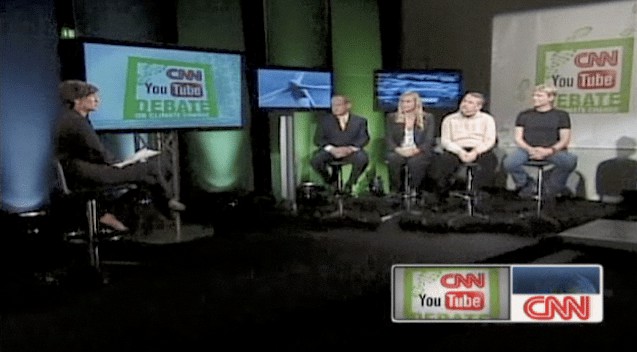
A CNN International debate programme that took viewers’ questions via YouTube broke UK rules by offering product placement and sponsorship to the Google (NSDQ: GOOG) video site, according to UK media regulator Ofcom.
The CNN YouTube Debate on Climate Change, as it was called, was aired on UK and worldwide TV in December, during the United Nations Copenhagen Climate Change Summit.
The show put YouTubers’ questions, comments and poems to a panel of guests, and featured several references to YouTube plus logos around the set and in graphics.
Now Ofcom, following an investigation, has found that the programme broke two rules of its Broadcasting Code – one barring sponsorship of news programmes, another barring product placement.
A viewer had complained to the regulator about the link-up. Turner Broadcasting System Europe had protested to Ofcom that the programme was a “lifestyle” and not a news programme and was not “sponsored” by YouTube because there was no commercial relationship. But Ofcom disagreed with the first assertion, since the show clearly aired during the topical and serious climate change debate.
And it also got hold, from Turner, of the contract between CNN and YouTube for the show, which promised to “prominently integrate YouTube and Google branding” and to make the “YouTube logo prominently displayed as part of the graphic”, which Ofcom said did amount to product placement. Turner then conceded that this was a template contract for such tie-ups that did not take account of Ofcom’s local regulatory environment.
Ofcom’s sponsorship-of-news-programmes regulation was recently introduced to its Broadcasting Code from the European Audovisual Media Services directive.
The finding makes it more difficult for TV channels to introduce user-generated input in to shows, if those shows make prominent reference to the channel by which the input is delivered. It means shows like the CNN YouTube U.S. presidental debates could never have been aired on UK TV.
Ofcom recorded no penalty against CNN; the breaches will be held on record against Turner.
In a similar ruling in March, Ofcom found that Moneysavingexpert.com Martin Lewis used a TV slot to direct people to his website in order to gain affiliate retail income.
Update: From a CNN spokeswoman: “Following Ofcom’s ruling, CNN welcomes the opportunity to discuss further the debate on the role of social media networks as legitimate news and information platforms/sources.”